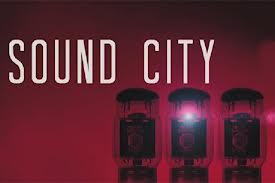
Dave Grohl’s directorial debut, “Sound City,” is in some respects a straightforward documentary about the legendary Los Angeles studio of the same name. But less directly, it’s about the continuing analog versus digital war, as well as how artists have found ways to remain relevant in a music industry that never stops evolving.
It’s that last part that interests us here at Sage Audio, and specifically whether or not it’s a good thing just about anyone can make a professional sounding album these days.
Even more than being about Sound City Studios, the documentary is about the analog Neve Console board that defined the sound on most of the records made in the studio. These records include some of the most legendary albums in rock history, including Fleetwood Mac’s self-titled debut, Tom Petty and the Heartbreaker’s Damn the Torpedoes , Nirvana’s Nevermind and many, many more.
But that Neve Console is also one of the focal points of how different creating records is now than it was when it was purchased. A studio worker points out that the custom board cost more than $75,000 when it was new, and for comparison’s sake adds that the house he had just purchased at the time cost less than $40,000.
Of course, today it is possible for independent artists to make an entire album for little more than the cost of a laptop and recording software, but the documentary questions if this has ended the traditional notion of what it’s like to make a record, and more importantly, is this a problem.
“In this age of technology where you can simulate or manipulate anything, how do we retain that human element?” Grohl asks during the film. “How do we keep music to sound like people?”
The studio never went fully digital, and it initially fell on hard times during the digital revolution of the mid to late 1980s. It made a comeback after Nevermind was recorded there and in one fell swoop reignited the music industry’s interest in recording more natural sounding music.
But though the studio never went digital, it didn’t eschew technology completely. Nevermind producer Butch Vig reveals that the studio had a copy of Sound Tools (the precursor to Pro Tools) when the album was made, and that he attempted to edit “Something in the Way” on the software (though he never specified if he actually got any editing done, as the technology was incredibly slow at the time).
Another example is Trent Reznor, who says that he always saw samples and other digital technology as instruments in themselves, saying he used samples because of their distinct sounds, not in an attempt to replicate a real instrument.
As evidenced in part by those last examples, the film isn’t protesting recording digitally, but it does have unkind words for those that use technology as a crutch instead of actually learning how to perform and write songs.
And though there are still studios that offer analog recording, digital is certainly the way most artists go, whether by artistic choice or because it is much less expensive. The somewhat hard to swallow evidence of this is that Sound City was forced to stop commercial recording in May 2011 - but Grohl purchased the Neve Console and put it to work in his own studio.
We provide our online mastering service to artists no matter how they record, and offer vinyl mastering services as well, for those that want to go the all-analog route. Like the documentary, we see great aspects in both analog and digital - in fact our own mastering room is a unique combination of vintage analog and cutting edge digital equipment.
While this isn’t a review, it’s also worth noting that “Sound City” is a great watch, particularly the latter portion that features Grohl recording with some of the biggest names in music, like Stevie Nicks, Trent Reznor and Paul McCartney.
Butch Vig serves as the producer of the McCartney session (which also features Nirvana bassist Krist Novoselic), and at one point Grohl joking tells Vig, after McCartney asks him about a part, “Yeah, Butch, tell Paul McCartney what to do.”
But the whole issue might be best summed up by an exchange between McCartney and Grohl - which would be true no matter if you are recording with computers or not:
Grohl: “Why can’t it always be this easy?”
McCartney: “It is.”